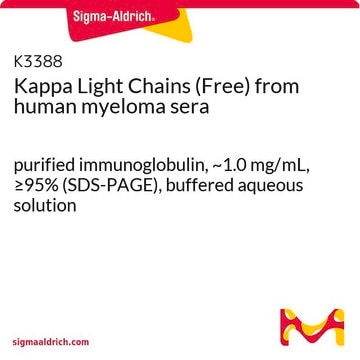K3502
Anti-Human Kappa Light Chain (Bound and Free) antibody produced in goat
affinity isolated antibody, lyophilized powder
About This Item
Productos recomendados
biological source
goat
Quality Level
conjugate
unconjugated
antibody form
affinity isolated antibody
antibody product type
secondary antibodies
clone
polyclonal
form
lyophilized powder
technique(s)
quantitative precipitin assay: suitable
storage temp.
2-8°C
target post-translational modification
unmodified
Gene Information
human ... IGK@(50802)
¿Está buscando productos similares? Visita Guía de comparación de productos
General description
Immunogen
Application
Physical form
Reconstitution
Disclaimer
¿No encuentra el producto adecuado?
Pruebe nuestro Herramienta de selección de productos.
Certificados de análisis (COA)
Busque Certificados de análisis (COA) introduciendo el número de lote del producto. Los números de lote se encuentran en la etiqueta del producto después de las palabras «Lot» o «Batch»
¿Ya tiene este producto?
Encuentre la documentación para los productos que ha comprado recientemente en la Biblioteca de documentos.
Los clientes también vieron
Nuestro equipo de científicos tiene experiencia en todas las áreas de investigación: Ciencias de la vida, Ciencia de los materiales, Síntesis química, Cromatografía, Analítica y muchas otras.
Póngase en contacto con el Servicio técnico












